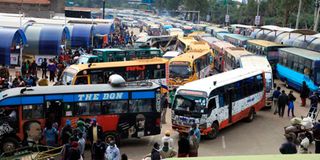It’s beneficial to be in a transport service cooperative than in sacco

PSV vehicles and passengers at Green Park terminus during a test run on June 18, 2021 conducted by Nairobi Metropolitan Services.
What you need to know:
- Saccos address the socioeconomic wellbeing of members through provision of affordable loans.
- Putting transport cooperatives in saccos is akin to organising a farmers’ cooperative society.
A fortnight ago (Daily Nation, April 5, 2022), I argued that matatus and boda bodas should be organised into transport service cooperatives rather than saccos. As if on cue, on April 6, 2022, the Commissioner of Cooperatives directed that they be so registered.
Saccos address the socioeconomic wellbeing of members through provision of affordable loans. The reason matatus and boda bodas are being organised into groups is not to access loans. No. It is to provide quality service to customers.
Putting transport cooperatives in saccos is akin to organising a farmers’ cooperative society, an agricultural cooperative which markets farm produce, into a farmers’ sacco, a financial cooperative to give members cheaper loans. Organising farmers or matatus and boda bodas into a sacco is beneficial but that should be a secondary objective to their primary business.
Transport cooperatives add value to core business; it’s not a punishment. The most obvious relates to economies of scale, leading to lower unit operating cost. There are other benefits.
First, every owner requires managerial support. It makes sense to have common transportation administrative activities to oversee a fleet of vehicles. Bookkeeping, accounting and vehicle use records are handled centrally instead of duplicating them by owners. It reduces overall management costs.
Cost-effective
Secondly, they could assume management of vehicle maintenance and repair. Each will keep a record of their vehicles and schedule the required maintenance. Cooperatives with garages may benefit further from bulk purchase of repair kits. They can also negotiate with reputable garages for fairer rates.
Thirdly, they build a pool for joint fleet purchase of vehicles when replacement is required. It may go for a specific brand or design, which will contribute towards building a recognisable transport brand.
Joint fleet purchase would also give it advantage in price negotiation, ultimately maximising the purchasing power of individual owners. Maintenance of the vehicles would be more cost-effective because of discount parts purchase and fleet rates can be easily attained .
Fourthly, using their numerical strength, they can procure online fleet management tools — like the cab hailing apps. Through the app, they may institute safety measures to enforce compliance using preset parameters and monitor and record driving behaviour like speeding, braking or acceleration. Driver behaviour is a core concern of road users.
A system that enhances security for drivers and passengers through on-board video recording to capture any incident on-board or on the road would be ideal. Real-time data from the apps will guide management decisions, essential in the current competitive environment. Using vehicle and driver data, a scoring system can be established for determining training opportunities and for use in reward and incentive programmes.
Increase profits
Fifth, with the help of driver performance apps, a cooperative can establish an enforceable code of conduct to which all drivers subscribe. This will lead to better driver performance on the road, resulting in reduced accidents. The knock-on effect is higher chances for negotiating lower insurance rates. It will also make urban centres more livable and encourage non-motorised travel.
Sixth, for the vehicle operators, it would facilitate group formation for the purpose of purchasing health insurance. That will provide an extra layer of social protection to drivers and their dependents.
Seventh, belonging to one allows promotion and branding of services at reduced cost. Businesses thrive by making their quality service and safety standards more visible.
Finally, they could run ancillary services such as petrol stations to allow for subsidised fuel purchase prices for members while providing the same service to other vehicles at market rates. This will increase profits.
Overall, forming transport cooperatives is a worthwhile effort beneficial to members, vehicle operators and the general public.
Prof Nyamongo, an anthropologist, Fulbright Scholar and 2022 Pelto International Award recipient, is a deputy vice-chancellor at The Cooperative University of Kenya. [email protected]. @Prof_IKNyamongo





